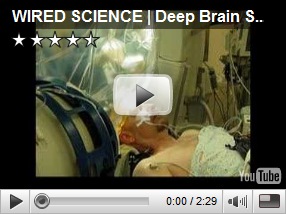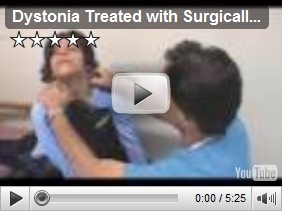This is an amazing new area and there are real success stories. We all do wonder though where will the future lie with this technology. After watching what DBS does for Parkinson's and Dystonia, it’s a miracle. There are also more videos on You Tube that show individuals turning off the device and they immediately revert back to where they were before the device was implanted too, so with Parkinson's and Dystonia cases where more than just a small portion of the body is affected, these devices have truly given many a new quality of life.
For an in depth look at what Deep Brain Stimulation can do, use this link to watch a study case from UCLA, amazing stuff as she couldn’t even walk.
Just this week though it seems Deep Brain Stimulation has now crossed into a new area, in other words the implant is being used to treat a “mental disorder” only and not something that has any physical issues connected, Obsessive Compulsive Disorder. This type of therapy I think is where most, and myself included question where is neurology headed with the technology to a degree. There have also been clinical trials with using the technology to with depression as well. Again, most though are not suggesting this as a first treatment, but rather one that can be used when other treatment plans, such as drugs are not working. Do we all have a little Obsessive Compulsive disorder in all of I might ask?
FDA OKs deep brain stimulation for Obsessive Compulsive Disorder - Medtronic
Here are a few related links involving implants and their treatment plans, an implant could help one lose weight or deal with depression so how close are we getting with relying on chips to help us through difficult situations?
Trick brain and turn appetite off – Implanted Device could be an alternative to bariatric surgery in time…
Pacemakers for the Brain - Depression Treatment...
In addition to permanent implants though, there is another line of brain science and technology that can be used as an alternative. This treatment plan states you can be treated on your lunch hour, no implant required for depression, transcranial magnetic stimulation, so you can be zapped with a 30-35 minute treatment too with no invasive surgery.
FDA Clears Neurostar® TMS Therapy For The Treatment Of Depression

Brainsway gets FDA nod for device trial – Another Device for Transcranial Magnetic Stimulation
Neurosurgery and brain stimulation, definitely a subject to read up on today and keep on top of what’s happening for sure. BD






You state: "Just this week though it seems Deep Brain Stimulation has now crossed into a new area, in other words the implant is being used to treat a 'mental disorder' only and not something that has any physical issues connected, Obsessive Compulsive Disorder."
ReplyDeleteThe brain is a physical organ, like the heart or liver. It can be damaged, for instance, through physical events such as injury or stroke, resulting in profound changes in mood, intelligence and behavior.
If the cause of a "'mental disorder' only" is actually due to some physiological dysfunction within the brain, then it may well not be the case that it is simply a problem which talk therapy alone can sufficiently address. That is why medications are used for OCD, depression, bipolar disorder and schizophrenia -- to induce actual physiological changes in the brain's chemistry.
I think one needs a deep and thorough knowledge of the neurobiology of mental illness (e.g., looking at brain imaging studies comparing OCD patients with control groups to determine whether differences in brain structure or function exist) in order to determine whether a particular treatment or procedure besides talk therapy alone, such as deep brain stimulation, could be genuinely effective.
Dismissing a potential treatment by creating a false distinction between physical and mental illnesses ignores the fact that the physical brain itself may be the basis for the mental illness, not simply that a patient has personal issues which can be resolved simply through talk therapy.
Whether or not a given treatment or device actually works is another question -- but awareness of the profound connection between the brain and the mind can not and should not be dismissed by referring to physical versus mental "only".
A California podiatrist named Tom Riess has developed a set of augmented reality glasses that can help people suffering from Parkinson's Disease walk straight,
ReplyDeleteI had DBS operation done in Birmingham AL. The BEST CHOICE EVER MADE because I have dystonia. I just want people with dystonia to realize there is HOPE when you think there is NONE. I went from being in a bed and everything on my body curled to walking and everything on me is uncurled now. Thanks to the doctors at UAB & my medtronic rep I have my life back
ReplyDelete